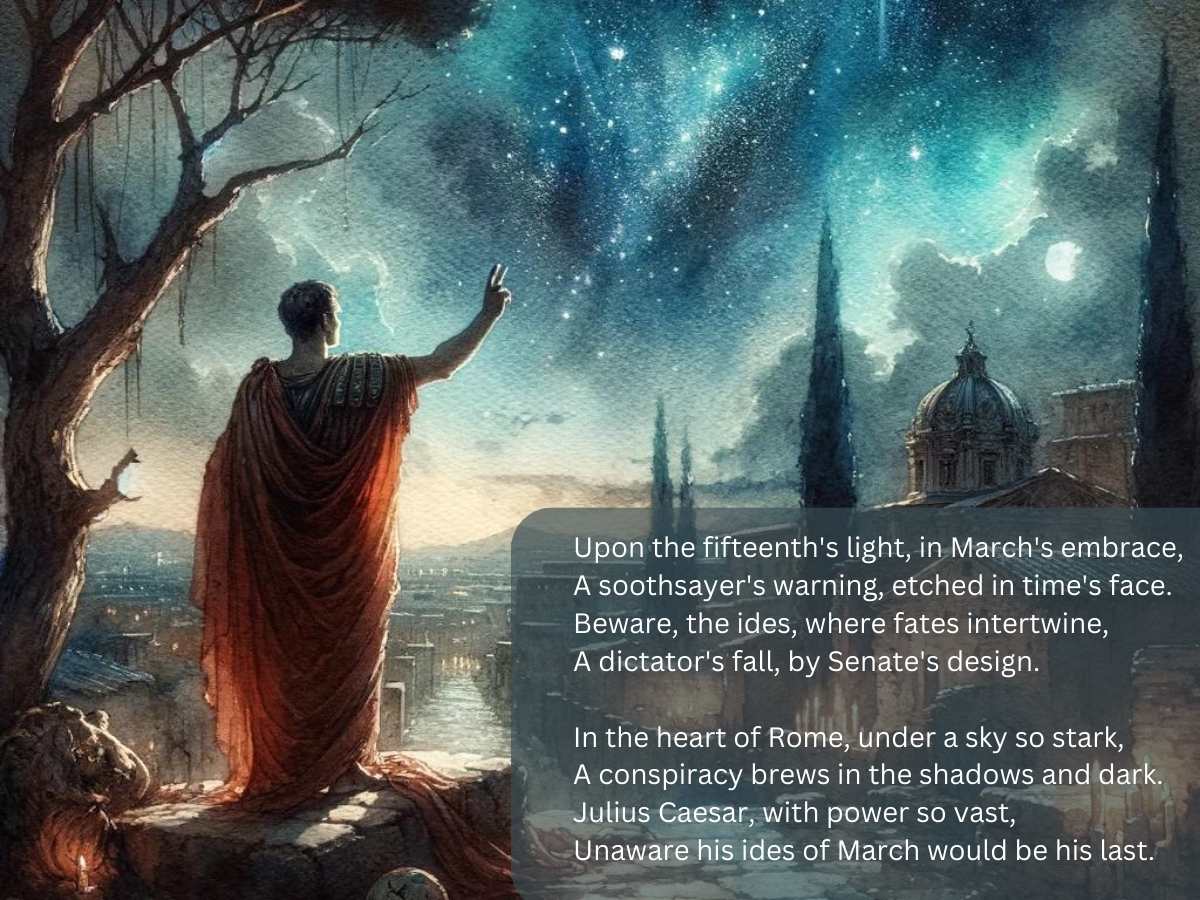Ides of March Poems
Table of Contents
The March Ides
Upon the fifteenth's light, in March's embrace,
A soothsayer's warning, etched in time's face.
Beware, the ides, where fates intertwine,
A dictator's fall, by Senate's design.
In the heart of Rome, under a sky so stark,
A conspiracy brews in the shadows and dark.
Julius Caesar, with power so vast,
Unaware his ides of March would be his last.
Friends turn foes, with daggers they come,
"Et tu, Brute?" - a betrayal, then some.
The ides of March, now a tale of lore,
A reminder of ambition's perilous shore.

Meaning
This poem explores the historical significance and the dramatic events surrounding the Ides of March, particularly focusing on the assassination of Julius Caesar. It reflects on the themes of betrayal, the fragility of power, and the inevitable fate that even the most powerful individuals cannot escape. The ides of March serves as a metaphor for the unpredictable nature of life and the consequences of human ambition.
Inspiration Behind
As I delved into crafting “The March Ides,” I was fascinated by the rich history and the intricate web of relationships that defined the Roman political landscape. The story of Julius Caesar’s assassination, a pivotal moment in history, inspired me to explore the themes of betrayal, power, and destiny. I envisioned the streets of Rome, the tension in the air, and the complex emotions of those involved in this historical event. This poem is a tribute to the timeless narrative of Caesar’s fall, aiming to capture the essence of this turning point in history through verse.
Echoes of March
In March's embrace, where omens dwell,
Whispers of fate, a foretold spell.
Beneath the calendar's ancient arch,
Looms the foreboding Ides of March.
A leader strides, his power vast,
Blind to the shadows that senators cast.
"Et tu?" he falls, his question stark,
A legacy ended, in daylight's mark.
The Senate's whispers, a dagger's kiss,
A moment sealed with betrayal's hiss.
The Ides of March, a history's part,
A tale of ambition, from Rome's heart.

Meaning
“Echoes of March” delves into the historical and symbolic significance of the Ides of March, reflecting on the themes of fate, betrayal, and the transient nature of power. It weaves a narrative around the cautionary tale of Julius Caesar’s assassination, underscoring the timeless lesson on the dangers of hubris and the inevitability of destiny. This poem aims to evoke a sense of foreboding and reflection on the impact of personal actions and historical events.
Inspiration Behind
Inspired by the rich tapestry of Roman history and literature, “Echoes of March” emerged from a fascination with the pivotal moment marking Julius Caesar’s assassination. The concept of the Ides of March, often associated with doom, served as a compelling backdrop for exploring deeper themes of power, loyalty, and fate. Through this poem, I sought to capture the dramatic tension and the poignant irony of Caesar’s downfall, crafting a narrative that resonates with the echoes of ancient Rome’s corridors of power.
Shadows Over March
March winds whisper through Rome’s streets,
A prophecy of deceit and feats.
The Ides await with looming dread,
Destiny’s canvas, threads of red.
Caesar walks, fate in time’s hand,
Unseen shadows plot, a grim stand.
Senators’ smiles, ambition’s guise,
In their hearts, betrayal lies.
“Et tu?” echoes, trust is marred,
Shattered by the Senate’s guard.
With each step, Caesar's breath,
The Ides of March, bring death.

Meaning
“Shadows Over March” delves into the intrigue and foreboding surrounding the Ides of March, emphasizing the tension and uncertainty that characterized Julius Caesar’s final days. This poem paints a vivid picture of conspiracy and betrayal, highlighting the fragile nature of trust and power. It serves as a reflection on the impermanence of authority and the inevitable consequences of unchecked ambition, encapsulating a moment in history that continues to resonate through time.
Inspiration Behind
In crafting “Shadows Over March,” I was drawn to the dramatic and almost theatrical elements that define the story of Caesar’s assassination. The juxtaposition of Caesar’s public persona against the private machinations of those he considered allies provided a rich narrative ground. This poem is an attempt to capture the essence of that historic betrayal, focusing on the symbolic weight of the Ides of March as a moment of transformation for Rome and a lesson on the nature of power and loyalty.
End Words
The exploration of the Ides of March through these poems offers a profound reflection on the themes of power, betrayal, and destiny. By delving into Julius Caesar’s dramatic downfall, the verses weave a narrative that transcends time, highlighting the fragile nature of authority and the eternal dance between fate and human ambition. These poetic interpretations serve not only as a homage to a pivotal moment in history but also as a contemplation on the cyclical nature of history and the human condition. Through the lens of ancient Rome, they echo timeless lessons that continue to resonate in the collective memory of humanity.







